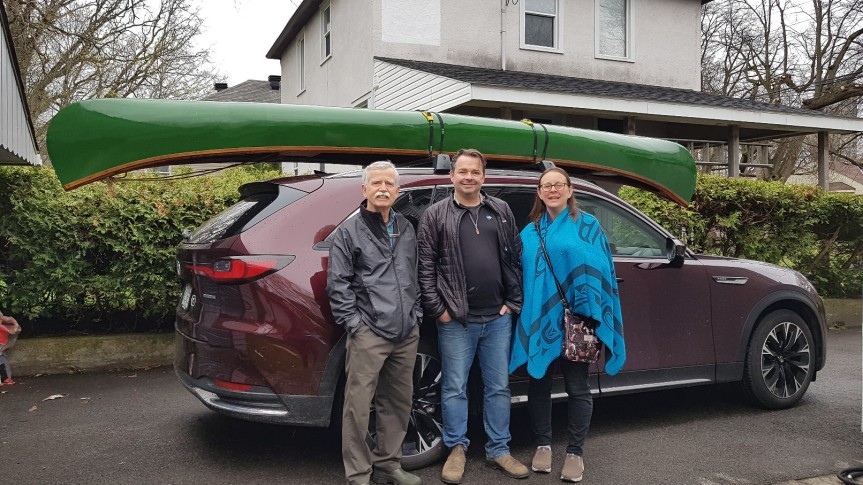On 2024-05-02 19:00, Daniel Buckles wrote (and had a later version published in the Ottawa Citizen):
When I was a teenager, decades ago, I read The Waste Makers by Vance Packard. Published in 1960, two years before Rachel Carson’s Silent Spring, the book was one of the earliest bestsellers on consumerism. It showed how industry pushes over-consumption and the impact this has on our values and the environment.
The lessons of this book have come home to roost for me over the last few months as my wife and I downsize in preparation for a move from Ottawa to Toronto where our son and his growing family now live. Downsizing—going from a three bedroom house we have lived in for almost thirty years into a small Toronto apartment—is both painful and liberating. A life-time of accumulation, even for a modest consumer such as myself, has taken months to go through, sort, separate and find homes for. My goal has been to re-home as much as possible, and not waste my priceless time on Facebook finding buyers for ten dollar items.
Thankfully, Ottawa offers more options than I realized. House to Home, a charity serving refugees settling here, took three waves of furniture and treasured art. Our huge collection of family photos was removed from frames and filed in folders, leaving the empty frames available for newcomers to Canada with photos of their own distant or lost families.
A basement full of artefacts from my youth (a rain stick) and decades of travel for work around the world (a traditional sword from Nagaland) left our home through two rounds of neighborhood garage sales. The Saturday mornings also provided opportunities to say goodbye to long time neighbours and finally meet a few only seen before in passing.
The oversized garage was a real challenge. A much beloved canoe, scraps of wood for projects never started, and tools—oh the many, many tools—were like albatrosses around my neck.

Social Media brought people to my door but neighbours and friends provided the keys to my release. A family from nearby bought the canoe and I discovered the Ottawa Outdoor Gear Library through a friend. It accepted donations of my camping gear, useable panniers and small weights, the kind of item they offer on loan to reduce financial barriers to being active and engaging with the outdoors. Low income families and new Canadians benefit from easy access to outdoor options they may never have considered.
The Ottawa Tool Library walks the talk of the circular economy, offering the tool you need once in a blue moon on loan and selling surplus tools at a very reasonable price. The Tool Doctor with the organization fixes donated tools when he can, or breaks them down into recyclable parts. It is a social space too, for how-to workshops and shared interests such as the beauty and history of vintage tools. A perfect loop.
Most of the things that only made it as far as the end of my driveway were made from plastic, a sobering symbol of a pressing environmental and health problem. Canada has just finished hosting a United Nations negotiation on plastic pollution aimed at creating a binding agreement to reduce and manage plastics production, use and end of life. Data released by the UN at the negotiations indicates that only 9% of plastics produced worldwide is actually recycled. The rest is being disposed of as litter – a blight particularly acute in the marine environment and the global south where much of our plastic waste is shipped. Using our blue box and making efforts to reduce and reuse are the right things to do, but sadly the scope of the problem is way beyond what we each can individually do. At the plastics conference in Ottawa, Nina Azzahra, a 16 year old Indonesian girl, repeatedly asked Canada not to send waste to her country where it often ends up in the local rivers, along roadsides and on farmland.
In nature there is no such thing as waste. Trees fall, insects curl and dry up, plants wither in winter, animals excrete, die and decompose. All are feeding the earth with their bodies only to be transmuted and reborn in some other form. Surely we can learn from this.
My downsizing travails are nearing the end and with the exception of plastics saw success on a number of fronts. It was not really that difficult to do given the volunteer organizations and openness of neighborhoods to the sharing economy. Waste does not have to be the end of all things. Consuming less in the first place, know what things are made of and choosing that which has the potential to be reused or properly returned to the earth are options available to us if we try. Enabling government policies would make a big difference and are also known and within reach if we demand them. We are all waste makers, but we can lessen the burden. It would also make the inevitable moment of our final downsizing easier too.
Daniel Buckles
“Connecting Worlds: a memoir on art, anthropology and activism”, by Daniel Buckles. Available at libraries and online.
![[Logo as used in Home Page and Elsewhere]](https://champlainpark.org/wp-content/uploads/2020/10/cropped-champlain-park-logo-emily-2020.08.06.jpg?w=104)

Daniel, don’t forget that before your own home downsizing, you have been upsizing the green spaces, trees populations and beautiful landscapes in our community. Thank you!
Michael Cheng